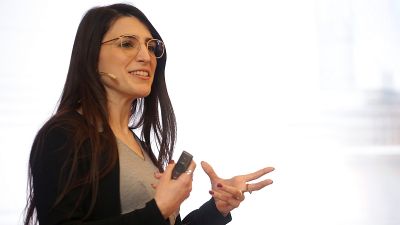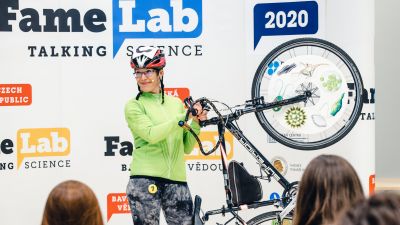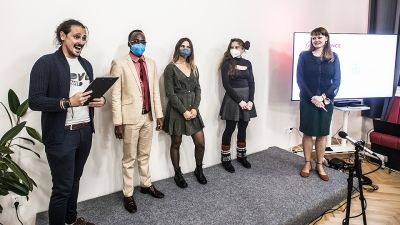The big FameLab training "MasterClass" took place over the weekend, where the finalists and runners-up got tips and tricks on how to improve their performances even more or how to communicate science better. The "FameLab Eleven" will compete for the win on 30 September during the final evening, which will take place at the newly opened Didaktikon Education Centre at the Kampus Hybernská multifunctional space.
"On Saturday morning, scientists from laboratories and libraries came in, and on Sunday, seasoned and wonderful science popularizers and popularisers left. It is amazing to see such a huge transformation," says Lucie Válová, who is in charge of this year's FameLab competition, at the end of the MasterClass weekend.
|
FameLab is a stand-up science competition that has its roots in England. Contestants have three minutes to explain their scientific topic, without the use of audiovisual equipment. The only tools allowed are those that the contestant can bring on stage themselves and also take away after the performance. The competition was set up in 2004 to seek new talent in science popularisation for the annual science festival organised by Cheltenham Festivals. The competition was a great success and soon spread to many places around the world - from Hong Kong to South Africa to the Czech Republic. The British Council brought the competition to the Czech Republic in 2011. The very first year (and the first time so far) the Czech representative, Michal Babič, won the People's Choice Award at the international final. Since 2022, the licence to host the competition in the Czech Republic is held by Charles University, which negotiated the possibility of participation of representatives of the humanities. |
"This weekend's training is the first opportunity for this year's finalists to meet each other. The purpose of the MasterClass is not only to provide information, tips and feedback on how to improve their performances, overcome stage fright or how to talk to journalists, but it's all about creating a friendly atmosphere between them. FameLab is not just about winning, it's about a community of like-minded people," the main organiser explains - delighted with how quickly the finalists became friends. "This was probably also due to our lecturers who were able to create a friendly atmosphere and break the ice very quickly."

Acting and English teacher Jat Dhillon (centre) prepared a number of practical exercises for the participants.
Engage emotions and tell stories
"Try to express love physically, with your body! Now the drama; the excitement; the wonder; the surprise," was one of the challenges that acting and English lecturer Jat Dhillon had prepared for this year's FameLab finalists. If you had visited the third floor of Kampus Hybernská last weekend, you probably wouldn't have guessed that you were looking at a group of young scientists and scholars practicing their presentation and theatrical skills to further engage, excite and "infect" you with enthusiasm and curiosity for just "their" research topic, the range of which this year is truly diverse.
"Charles University managed to negotiate that for the first time social-humanities topics can also participate in the competition," says Lucie Válová. "You can look forward to presentations on the sociology of sport or Czech dialects of the past and present. But there will also be more 'traditional' topics for FameLab, such as quantum chemistry, cancer research or how to improve the lives of people with diabetes," says the main organiser.
In addition to tips on what makes a successful FameLab performance, the participants learned a lot about science communication in general. Malcolm Love, a long-time FameLab lecturer who helps scientists and academics communicate science better, joined in regularly online. His clients include NASA, CERN, the British Academy, many universities and other organisations.
The author of this article, the science journalist of Charles University's Forum magazine, also shared her experience on how to bridge the worlds of science and media to the mutual satisfaction of scientists and journalists.
Dáša Sephtonová, who led the Czech FameLab under the British Council from 2011 to 2021, also did not miss the weekend training. ",I feel that I have moved from the position of 'mother' to the position of 'grandmother' - by that I mean that I am still very interested in the competition and I wish it a great future with a good group of friends - i.e. inspiring competitors, solid background and generous sponsors. Of course, I am always happy to help out if needed, but I no longer have the main responsibility - that has been taken over by Lucie Válová and Charles University. I am glad that FameLab is in such good hands.''
Who will win this year's FameLab?
We will find out on September 30 at 6 pm during the final evening, which will take place in the newly opened Education Centre Didaktikon at Kampus Hybernská (Registration). The jury and the audience will choose from the following eleven:
• Anney Roy – First Faculty of Medicine, Charles University
Name of the show: Light & Sound Stimulation
Why did she apply for the FameLba? "Well, why not Famelab? It is the perfect place to realise the research that resonates within us."
• Hubert Beck – Faculty of Mathematics and Physics, Charles University
– Faculty of Mathematics and Physics, Charles University
Name of the show: Invariance and equivariance in daily life and physics
When the word 'science' is said, he imagines: the very foundation our civilisation is built on.
 • Filip Kubeček – Institute of the Czech Language,Czech Academy of Sciences
• Filip Kubeček – Institute of the Czech Language,Czech Academy of Sciences
Name of the show: Czech dialects in the past and nowadays
When the word 'stage' is said, he imagines: A space for people who have something to share.
 • Fereshteh Amirmohammedi – University of Hradec Kralove
• Fereshteh Amirmohammedi – University of Hradec Kralove
Name of the show: Win-win interaction
When the word 'science' is said, she imagines: an answer to my curiosity.
 • Matouš Veselský – Faculty of Humanities, Charles University
• Matouš Veselský – Faculty of Humanities, Charles University
Name of the show: When It's Not "Just" About Sports. Sociology of Sport and Sports Mega-Events
Why did he apply for FameLab? "Because Famelab mix all these feelings and emotions of excitement and adventure into one specific, extraordinary experience. And I just love it."
 • Terezie Páníková – University of Chemistry and Technology adn Institute of organic chemistry and biochemistry CAS
• Terezie Páníková – University of Chemistry and Technology adn Institute of organic chemistry and biochemistry CAS
Name of the show: How to sweeten life for people with diabetes?
When the word 'science' is said, she imagines: discovering new exciting unknowns.
• Jiří Vele – Fakulty of Architecture, Czech Technical University in Prague
Name of the show: Robotic 3D printing of building elements
When the word 'science' is said, he imagines: fun, challenge, space, robots.
 • Tomáš Nováček – Faculty of Information Technology, Czech Technical University in Prague
• Tomáš Nováček – Faculty of Information Technology, Czech Technical University in Prague
Name of the show: Compete in FameLab from the comfort of your bed
When the word 'science' is said, he imagines: A way how to discover what the world is about and how to use it for our well-being.
 • Jakub Martinka – J. Heyrovský Institute of Physical Chemistry of the CAS
• Jakub Martinka – J. Heyrovský Institute of Physical Chemistry of the CAS
Name of the show: Quantum Chemistry in the Age of Machine Learning
When the word 'stage' is said, he imagines: Something new. It's a challenge for me, but it's also a way to share my enthusiasm for science and maybe popularize issues that are just plain cool. Who wouldn't want to talk publicly about something they're passionate about?
 • Lucie Urbanová – First Faculty of Medicine, Charles University
• Lucie Urbanová – First Faculty of Medicine, Charles University
Name of the show: Pills or therapy?
When the word 'science' is said, she imagines: A few years ago I would have imagined a lab full of test tubes, something I will never, ever do. Now working with people and finding new solutions.
 • Eliška Jandová (she can not attend the weekend worskhop) – Faculty of Science, Charles University
• Eliška Jandová (she can not attend the weekend worskhop) – Faculty of Science, Charles University
Name of the show: Hope in a drop of blood
When the word 'science' is said, she imagines: Something very beautiful. Something that makes my life very interesting and challenging, but also something that sometimes makes it very difficult.
























